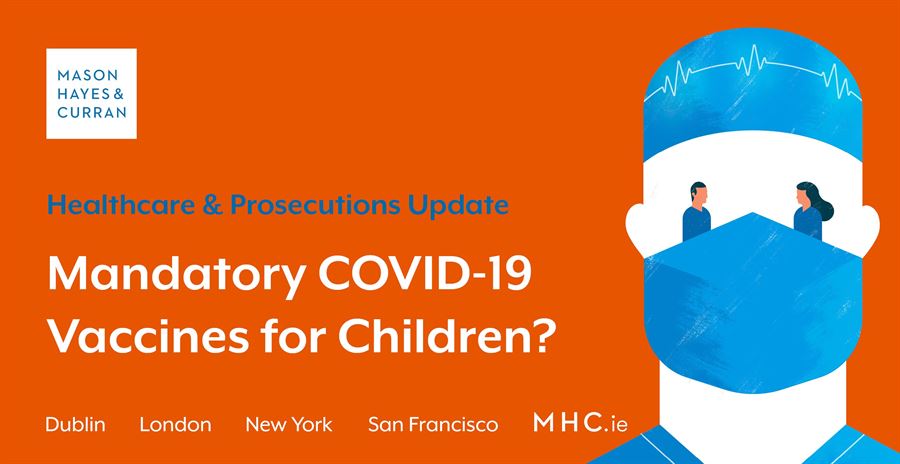
COVID-19 vaccines have brought much needed relief in the fight against a global pandemic that has dramatically changed life in Ireland since March 2020. The government has set out here the order of priority for people in Ireland to be vaccinated. Other than minors over 16 with underlying conditions, children are in the fifteenth and final category, along with pregnant women. Can children be vaccinated against the wishes of their parent(s)? We break down the possibilities below.
Minors aged 16 or older
The Non-Fatal Offences Against the Person Act 1997 states that minors over the age of 16 can give consent to ‘any surgical, medical or dental treatment’. Where they do provide that consent, it is not necessary to obtain the consent of the minor’s parent or guardian. A vaccine would almost certainly be interpreted as medical treatment. Therefore a 16 or 17 could be vaccinated in the absence of parental consent.
Minors aged 16 or younger
Parental consent is generally required to administer medical treatment to children or adolescents, save in emergency situations. In the absence of legislation introducing mandatory COVID-19 vaccines for children, it is highly unlikely that parental consent could be overruled to administer the vaccine to children. However, there may be some limited exceptions to this, which we consider next.
Minors with underlying conditions
As outlined above, a minor aged 16 or older who suffers from an underlying condition that may put them at risk of severe disease or death from COVID-19 can themselves provide consent to receiving the vaccine.
However, in the example of a child aged under 16 years old with a serious underlying condition, where the clinical team believe that it is both appropriate and in the child’s best interests to receive the vaccine, but where the parent or parents will not provide consent, the position is less clear. Two Supreme Court judgments are instructive. A 2001 decision1 held that although a heel prick test, also known as a PKU test, was clearly in the best interests of the newborn baby, it could not be administered without parental consent. In that case, the Court declined to dispose with parental consent in the absence of an ‘immediate and fundamental threat’ to the child.
Article 42A of the Constitution, enacted in 2015, introduced a new test which permits the State to intervene where parents ‘fail in their duty towards their children to such extent that the safety or welfare of any of their children is likely to be prejudicially affected’. This could apply to any number of scenarios, but the Supreme Court comprehensively considered this constitutional amendment for the first time in a recent decision (read more here). The majority judgement held that the parents’ refusal to consent to medical treatment amounted to a failure in their duty.
It is possible that a situation could arise in the near future where a child or adolescent under the age of 16 with an underlying condition such as cystic fibrosis, cancer or congenital heart disease is deemed to be an appropriate candidate for a COVID-19 vaccine, but parental consent is not forthcoming. In the absence of agreement, an application to the High Court would ultimately be required.
Children in care
It is worth briefly considering the position of children who are in the care of the State. Whether the State can consent to children in care receiving the COVID-19 vaccine will depend on the basis that they are in care. If the children are the subject of voluntary care arrangements or interim care orders, it would be ill-advised to proceed to vaccination in the absence of parental consent or a court direction2. Where a child or teen is the subject of a full care order3, Tusla assumes the role of legal parent, and is empowered to do what is reasonable to protect the child's health, development or welfare. It is likely that the law would be interpreted to permit Tusla to consent to a vaccine, subject to the views and wishes of the child or young person in question.
Conclusion
It is clear from the above that COVID-19 vaccination for children can throw up any number of dilemmas. As more data emerges on the efficacy and safety of the various vaccines, parents can look forward to greater peace of mind when it comes to deciding whether to consent to their child receiving a vaccine. However, there may be cases where the views of medics and parents are irreconcilable, and in those situations a court application, most likely under the wardship jurisdiction, may be the only way forward.
The Health and Prosecutions team provide clear, reliable and expert advice on wardship cases, including wardship for minors. Recent instructions include:
-
Advising the HSE on administering COVID-19 vaccines to Wards of Court
-
Acting for a children’s hospital on end-of-life care cases
-
Advising HSE and hospital groups on the use of wardship in the context of eating disorders
The content of this article is provided for information purposes only and does not constitute legal or other advice.
[1]& North Western Health Board v. W. (H.) & Anor [2001] IESC 70
[2] Section 47, Childcare Act 1991
[3] Section 18, Childcare Act 1991






